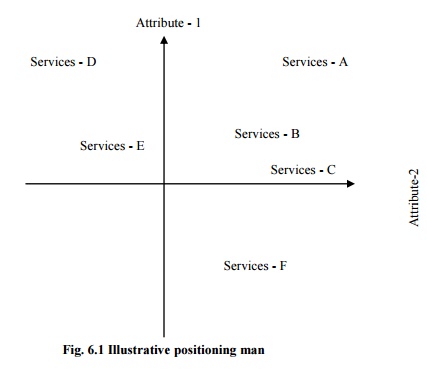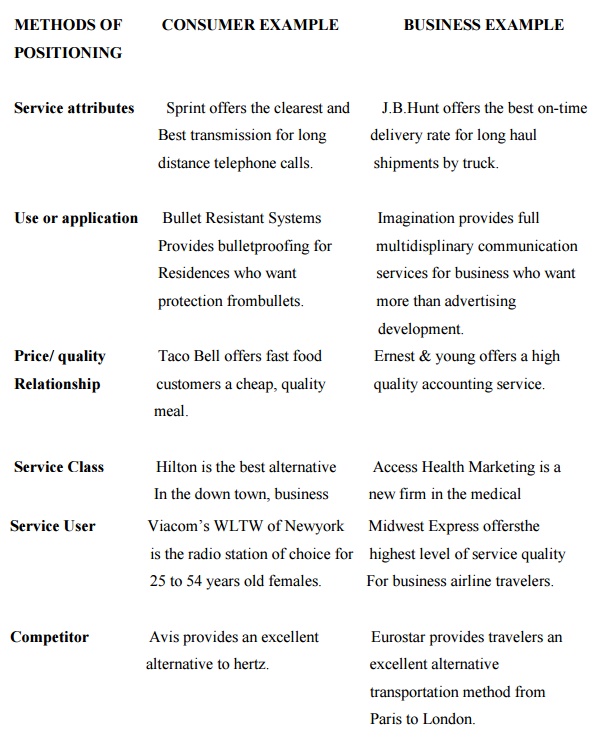Chapter: Business Science : Services Marketing : Service Delivery and Promotion
Positioning of services
SERVICE DELIVERY AND PROMOTION
Process of Positioning
Product positioning involves a number of steps
including the following:
Determining levels of positioning
Identification of key attributes of importance to
selected segments
Location of attributes on a positioning map
Evaluating positioning options
Implementing positioning.
Determining levels of positioning
The first step in
positioning is to determine which level(s) –service level, product sector
level, corporate level –are to receive explicit positioning attention. Some
examples will illustrate the choices that are made by some service
organizations. The level or levels of positioning to be undertaken are usually
fairly clear out, although some organisation, have placed different emphasis on
these levels at different points in time.
Identification of
attributes Once the level of positioning has been
determined it is necessary to identify the specific attributes that are
important to the chosen market segments. In particular, the way in which
purchasing decisions are made should be considered. Individuals use different
criteria fro making a purchase decision of a service.
Location of attributes on positioning
map
The positioning process
involves the identification of the most important attribute and location of
various companies‟ services, for theseattributesattribare identified,
statistical procedures exist for combining these attributes into aggregate
dimensions. Such dimensions are referred to by various names such as principal
components, multi-dimensional scales, factors etc. depending upon how the data
were elicited and which statistical procedures were used. Usually two
dimensions are used on positioning maps and these often account for a large
proportion of the „explanation‟ of
the customer‟s preference.
Products or services
are typically plotted on a two dimensional positioning man such as show in the
following figure. The positioning map can be relation to the selected
attributes. The analysis can be further developed by drawing separate
positioning maps for each market segment. Customers in each market segment may
perceive the service and its benefits differently and different map will show
these different positions.

Fig. 6.1 Illustrative
positioning man
Positioning maps can be
based on either objective attributes or subjective attributes Maps can also use
a combination of objective and subjective attributes.
Evaluation positioning options
·Strengthening current
position against competitors to avoid head-on attack.
·Identifying an
unoccupied market position that was not filled by a competitor
·Repositioning the
competition.
Once a company had
identified where it is positioned at present, it then needs to determine how to
enhance or sustain its position relative to its competitors.
Criteria for good positioning
·The positioning should
be meaningful.
·The positioning must be
believable.
·The
positioning must be unique.
Implementing positioning and the
marketing mix
How a company and
service is positioned needs to be communicated throughout all of its implicit
and explicit interactions with customers. This suggests that all elements of
the company, its staff, policies and image, need to reflect a similar image
which together conveys the desires position to the market place. This means
that a company must establish a strategic positioning direction, which is
followed through in all of its tactical marketing and sales activities.
A successful
positioning strategy should make the service clearly distinguishable by
features which are desirable and important to the target customer segment. This
means that the positioning strategy should be examined from time to time to
ensure that it does not become outdated and that it is still relevant to the
target market segment.
The marketing mix is
the key to implementing a positioning strategy. The design of the marketing mix
to implement the positioning must be based on the key salient attributes
relevant to the target segment. These attributes should be identified in the
context of analysis of competitors, whose positions should be assessed to
discover their vulnerability. All the elements of the marketing mix can be
utilized to influence the customer‟s perception and hence The marketing mix can
be used to develop a coherent totality that creates the positioning in the
customer‟s mind.
Importance of Positioning
Positioning involves
both launching new brands into the marketplace (new brand positioning), and
repositioning old brands. It is concerned with the differentiation of products
and services and ensuring that they do not degenerate into a commodity. To
maximize its potential a company should position itself in its core market
segments, where it is objectively or subjectively differentiated in a positive
way over competing offerings.
Positioning is
particularly import for services in the market. As a result of competitive
pressure the consumer is becoming increasingly confused by the huge offering of
services within each market sector. These offering are communicated by a vast
number of advertising messages promoting different features of the services.
The key to a successful positioning strategy is to promote the feature which
the company is best and which exactly matches the needs of the customer.
Because of
intangibility and other features associated with services, consumers find that
differentiation of services can be more difficult and complex. Successful
positioning makes it easier for the customer to see a company‟s services as
being different from others and exactly what is wanted.
Positioning is a strategic marketing tool which
allows managers to determine what their position is now,
what they wish it to be
and what actions are needed to attain it. The permits market opportunities to
be identified, by considering positions which are not met by competitors‟
products. It therefore helps influence both product development and the
redesign of existing products. It also allows consideration of competitor‟s possible moves and
responsesconceptis often considered at the product level although it is also
relevant at the product sector and organizational level. Positioning involves
giving the target market segment the reason for buying your services and thus underpins
the whole marketing strategy. It also offers guidelines for development of a
marketing mix with each element of he it being consistent with the positioning.
Positioning services in competitive markets
Service represent
a.
Speed with which service is delivered to
the quality of interaction between customers and service personnel.
b.
Convenience –service delivered at
convenient location, available at convenient times.
Postioning strategy:
It is concerned with
creating and maintaining distinctive differences that will be noticed and
valued by those customers with whom the firm would most like to develop
long-term relationship.
It requires to understand
a. Target customers
preferences b.Characteristics of their competitors offerings.
I.
Focus underlies the search for
competitive analysis:
As competition
intensifies in the service s organizations to differentiate their products in
ways that are meaningful to customers. It is not realistic
for a firm to try to appeal to all potential buyers in
a market because
(i) The customers vary
in their needs purchasing behaviour, consumption pattern and geographically
wide spread.
Important Vs. Determinant attributes:
Determinant attributes:
These are the
attributesng thatcompeting alternativesdeterminethatareimportantbuyer to
purchases, which customers see significant differences among competing
alternatives.
Ex: Airlines –
Convenience of departure
Convenience of arrival time
Availability
of frequent flyer
Case
of making reservations.
Important Atrributes
· Price which is
quantitative and can be measured.
Positioning distinguishes a brand from its
competitors:
Competitive positioning
strategy is based on establishing and maintaining a distinctive place in the
market for an organisation / individual product offerings.
1.
A company must establish a position in
the minds of its targeted customers.
2.
The position should be singular,
providing one simple and consistent message.
3.
The position must set a company apart
from its competitors.
4.
A company cannot be all things to all
people; it must focus its efforts.
“Positioning needs to keep competitors out not
draw them it.”
Copy positioning Vs. Product positioning
Copy positioning:
People make decisions
based on their perceptions of reality rather than o reality.
Marketers associate positioning primarily with the communication elements of the marketing
mix,
advtg, promotions and public relations which creates
good image and associations so as to give them a
special distinction in the customers mind.
Product positioning
To improve a product‟s
appeal to a specific t certain attributes.
· Reduce its price
· Alter the times and
locations when it is available.
· Performance, price,
availability
Positioning role in marketing strategy:
Ø
It plays important role because it
links market analysis and competitive analysis to internal corporate analysis.
[Refer pg. 66 Table 3-1 of zeithmal]
Ø
Because services are intangible,
explicit positioning strategy is valuable in helping prospective customers to
get a mental fix on a product.
Ø
The organization is pushed into a
positive where it faces head on competition from stronger competitors.
Ø
The organization is pushed into a
position that nobody else wants, because there is little customer demand.
Ø
The organization‟s product‟s
position is The organization‟s
product‟s position is so blurred that nobody knows what it‟s distinctive competence
is.
Ø
The organization has no position at
all in the market place because nobody has ever heard of it.
CUSTOMER POSITIONING OF SERVICES
Consumer positioning of
a service involves two concepts. First, it means the position the firm or
organization occupies in the minds of consumers. What a company thinks is their
position in the market place does not matter. Rather, it is what the consumers
think that is important. Second, positioning is always relative to the
competition. In choosing a service firm, consumers will compare its service
offerings to other firms within the industry.
METHODS OF POSITIONING
Services can be positioned in 6 different ways. They
can be positioned by service attributes, use of application, price/ quality
relationship, service class, service user, or competitor.

Service attributes involve
positioning the service in terms of what it does best. For instance, Federal
Express tries to
position itself as the best f as the best firm for “package delivery”.
Use or application can
be used for positioning. Fitness centres are often positioned inthis way. Some
fitness centres will cater to individuals who want to reduce weight, while
others position themselves for individuals who want to exercise or on weight
lifting or conditioning. Each position targets a different market segment and
requires a unique combination of equipment and physical facility design.
Price- Quality relationship can
also be used for positioning a firm.
The fourth means of consumer positioning is by service
class. Pizza Hut wants to be positioned as a
„dine- restaurant‟,-foodresnotaurantfast.
Their advertisem-in restaurant in the pizza industry”.
Some services are
positioned according to service users. Service providers can also
position themselves relative to a competitor.
Related Topics